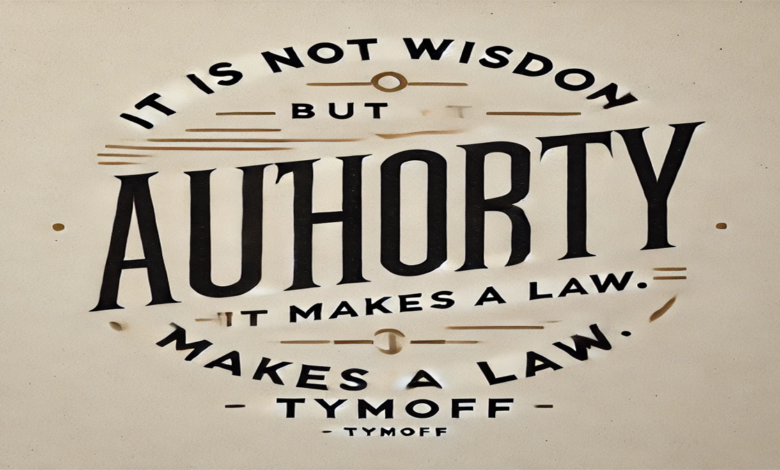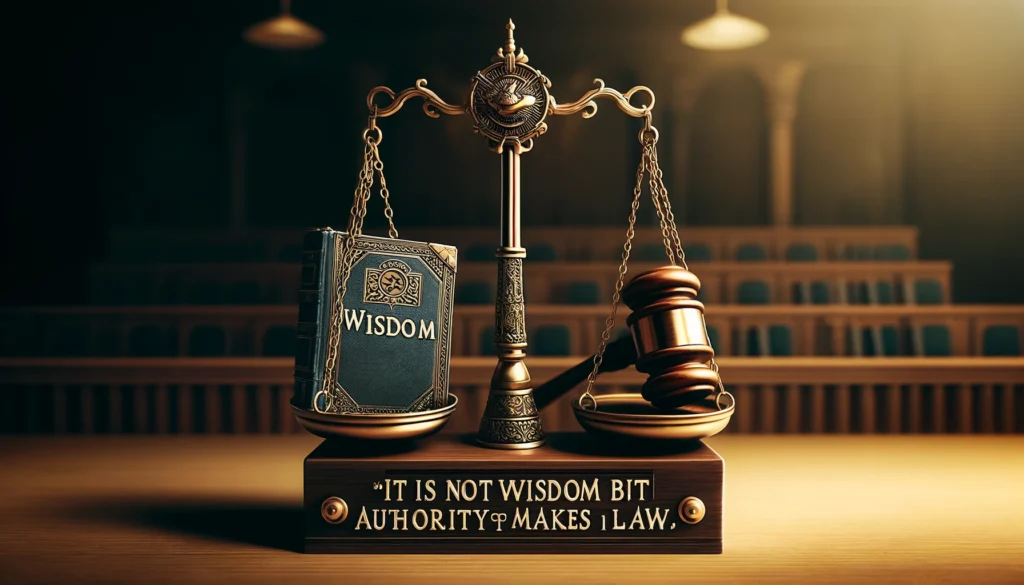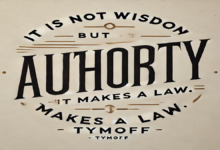“It is not wisdom but authority that makes a law. t – tymoff: An In-Depth Analysis

In our daily lives, It is not wisdom but authority that makes a law. t – tymoff are all around us. Whether we are driving on the road, making business decisions, or simply navigating through society, we follow rules that govern our behavior. But have you ever stopped to wonder what exactly makes something a law? Is it wisdom, justice, or the authority that enforces it? The quote, “It is not wisdom but authority that makes a law” by T. Tymoff, brings a unique perspective to this conversation. This article delves deep into the meaning of this statement, its relevance in today’s society, and how authority plays a critical role in shaping laws. Let’s explore how authority, not wisdom alone, is at the core of what makes a law.
Understanding the Quote: “It is not wisdom but authority that makes a law. t – tymoff

The statement by T. It is not wisdom but authority that makes a law. t – tymoffchallenges the common perception that laws are created solely based on wisdom and fairness. Traditionally, many people believe that the most just laws are those that reflect the wisdom of society’s leaders or philosophers. However, Tymoff’s quote suggests that it’s not the inherent wisdom of the law that defines its legitimacy, but rather the power and authority behind the law’s creation and enforcement.
What Does the Quote Mean?
At its core, Tymoff’s quote reflects a critical viewpoint about the nature of law and authority. It implies that laws are not simply born from the ideas of moral thinkers, but from institutions or individuals who hold the power to impose and enforce those laws. The law’s strength and impact depend on the authority of the lawmaker or the enforcer, rather than the underlying wisdom behind it.
The Role of Authority in Lawmaking
Laws can be defined as rules created by authorities (such as governments, monarchs, or legislative bodies) to regulate the behavior of people in society. While wisdom is important in creating laws that promote fairness and justice, authority ensures that laws are respected, obeyed, and upheld.
What is Authority in Lawmaking?
Authority refers to the power or right to make decisions, give orders, and enforce obedience. When we talk about authority in the context of law, it is the power of governing bodies, such as:
- Governments: National, regional, and local governments hold the authority to enact laws that affect various aspects of society.
- Judiciaries: Courts and judges wield authority to interpret laws, resolve disputes, and ensure that laws are applied fairly.
- Law Enforcement: Police officers, sheriffs, and other agencies have the authority to enforce laws by detaining criminals, issuing fines, or enforcing legal actions.
Laws without authority are meaningless. It’s the authority behind the laws that gives them power. Without this authority, there would be no way to ensure that laws are followed, which would lead to chaos.
Why Authority Matters More Than Wisdom in Lawmaking
You might be thinking, “But shouldn’t wisdom be the key factor in making laws?” While wisdom certainly has its place, let’s explore why authority holds a more significant role when it comes to lawmaking.
Wisdom vs. Authority: Two Different Forces
- Wisdom can help in creating laws that are fair, just, and beneficial to society. However, it does not guarantee that laws will be followed or enforced. People might still ignore or violate them if they believe those laws don’t apply to them.
- Authority, on the other hand, ensures that laws are obeyed, even if individuals do not agree with them. It is the authority that imposes consequences for law-breaking and upholds the integrity of the legal system.
Thus, while wisdom may inform lawmaking, authority is what makes a law effective. Without enforcement mechanisms, laws could easily be ignored, leading to a breakdown of order.
Examples from History
Throughout history, there have been numerous examples of laws that were enacted due to the authority of rulers, even when the wisdom behind them might have been questionable.
- King Hammurabi’s Code: One of the earliest known law codes, the Code of Hammurabi, was created around 1754 BCE. While it contained some wisdom, the real power behind it came from Hammurabi’s authority as king. His authority ensured that his laws were followed throughout his empire.
- Slavery Laws: In the United States, laws supporting slavery were enacted and enforced by government authorities. These laws, although morally questionable today, were backed by the authority of the state and its institutions.
These examples show that laws can be enforced even if the wisdom behind them is disputed. Authority is what guarantees their existence and execution.
The Evolution of Authority in Lawmaking
Over time, the concept of authority in lawmaking has evolved significantly. Ancient rulers wielded absolute authority, while modern democracies use collective authority to create laws. Let’s look at how authority has transformed throughout history.
Ancient Systems of Authority
In ancient times, authority to make laws often resided with a single ruler, such as a king or emperor. The law was often seen as a direct reflection of the ruler’s will. These leaders did not always consult with the public, nor were they necessarily guided by wisdom. Instead, the king’s word was law.
The Rise of Democracy and Collective Authority
In contrast, in modern democratic societies, the authority to make laws is vested in the people through elected representatives. The wisdom behind these laws is still important, but it is the authority of the government, backed by public support, that ensures the laws are enacted and enforced. This shift toward collective authority has made lawmaking more inclusive and just, allowing society’s needs and wisdom to play a larger role in shaping legal systems.
Judicial Authority
The authority of courts and judges has also evolved. In earlier times, judges were often appointed by monarchs and were seen as extensions of the ruler’s authority. Today, judicial systems are more independent, ensuring that laws are interpreted and applied fairly, based on constitutional principles, precedents, and public interests.
The Balance Between Wisdom, Authority, and Justice
While authority plays a dominant role in making laws, there is an undeniable need for wisdom in ensuring that those laws serve the greater good. Ideally, laws should be created with both wisdom and authority, with wisdom guiding the creation of just and fair laws, and authority ensuring that those laws are respected and upheld.
A Case for Balanced Lawmaking
To create effective and fair laws, it is essential to strike a balance between wisdom and authority. Here are a few key points to consider:
- Wisdom in Lawmaking: Laws should reflect society’s values, promote justice, and address societal issues.
- Authority in Lawmaking: Laws must be backed by legitimate authority to ensure that they are respected and enforced.
- Justice: At the heart of lawmaking, there should always be a pursuit of justice, where both wisdom and authority work together for the common good.
The interaction between wisdom and authority in lawmaking is not an either/or situation. Instead, it’s about finding the right balance that ensures laws are both fair and enforceable.
Why Do We Follow Laws Made by Authorities?
Have you ever wondered why people follow laws, even when they don’t always agree with them? The answer often lies in the authority of the law. Even in situations where the wisdom of the law may be questionable, people tend to follow laws because of the fear of consequences.
Consequences of Disobeying the Law
The enforcement of laws is what differentiates legal obligations from mere suggestions. Some of the consequences of disobeying the law include:
- Fines and Penalties: Most laws are enforced through financial penalties.
- Imprisonment: In cases of serious violations, individuals can face jail time.
- Loss of Rights: Some laws lead to the suspension or loss of certain privileges or rights.
These consequences, enforced by authorities, play a major role in why laws are followed by society. Without enforcement, laws would simply be guidelines or ideals, not binding rules.
Conclusion: The Power of Authority in Lawmaking
As we’ve seen throughout this article, the statement “It is not wisdom but authority that makes a law” rings true in many aspects of our society. While wisdom is important for creating just and fair laws, it is the authority that gives these laws strength and ensures they are followed. In a society, where authority is respected, laws become powerful tools for maintaining order and ensuring justice.
The relationship between wisdom, authority, and lawmaking continues to evolve. As democracies grow stronger, there is a greater emphasis on collective authority, ensuring that laws reflect the values and needs of the people. Nevertheless, authority will always be a key element in making laws effective.
So, while we may always strive for wisdom in lawmaking, it is the authority behind the law that truly shapes the way society operates. After all, it’s not just about wisdom—it’s about who has the power to make and enforce the law.
